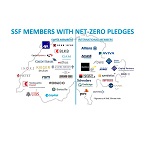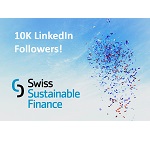| |
|
|
| |
|
|
| |
|
SSF Newsletter March 2022
|
| |
|
Closing the Gap
|
| |
|
Dear Sir or Madam,
|
| |
|
Between 2010-2019 average annual global greenhouse gas emissions reached their highest levels in human history, but at least there is one positive message: the rate of growth has slowed down. These and other facts can be found in the latest Intergovernmental Panel on Climate Change (IPCC) report released this month (see reports section of this newsletter).
Sufficient financing is crucial for the urgently needed transition to a low-carbon world. It comes as no surprise that politicians and civil society express growing expectations on the financial sector to further support the needed transition to a low carbon economy through climate aligned finance. The IPCC report looks beyond technologies and illustrates that current financial flows are now three to six times lower than what is needed by 2030 to limit warming to below 2°C. However, closing the investment gap relies on clear signalling from governments and the international community to all sectors, including a stronger alignment of public sector finance.
In Switzerland, the government has recently encouraged action on two levels: while the new ordinance on climate reporting that is currently open for consultation is relevant for all sectors, the development of new SDG financing solutions by the SDG Impact Finance Initiative (SIFI) is primarily addressing asset managers. We are convinced that both initiatives support an accelerating transition.
|
|
| |
|
|
Kind regards,
Jean Laville
SSF Deputy CEO
|
| |
|
|
|
| |
|
|
| |
| |
| |
|
SSF activities at a glance
|
| |
|
| |
|
36 SSF members with a Net Zero Pledge
|
| |
|
SSF now has 36 members with a net zero pledge. Our newest signatory is Capital Dynamics (Net-Zero Asset Manager Initiative). Several SSF members (EY, KPMG, S&P Global, PwC, MSCI and Qontigo) have signed the new Net Zero Financial Service Provider Alliance. Visit our website to view member statements and for more information.
|
| |
|
|
|
| |
| |
|
SSF has over 10K followers on LinkedIn
|
| |
|
This month SSF was delighted to announce that more than 10’000 people follow the SSF LinkedIn page. SSF uses this platform to highlight content from our website, post about events and inform on other key SSF activities.
|
| |
|
|
|
| |
|
|
| |
| |
| |
|
Regulatory and market news
|
| |
|
| |
|
Swiss News
EU News
International News
- The Science based Targets initiative (SBTi) has updated its fossil fuel policy, so that targets from fossil fuels companies will no longer be validated and existing commitments from fossil fuel companies will be removed.
- The International Bank for Reconstruction and Development (IBRD) launched a so called “Rhino Bond”, a five year $150 million Sustainable Development Bond which will contribute to protecting rhino populations in two protected areas in South Africa and includes a performance payment from the Global Environment Facility (GEF).
- The Task Force on Nature-related Financial Disclosures (TNFD) released the Beta version of the disclosure framework for feedback. The final version is due for publication in Q3 2023.
- Canada introduces mandatory climate disclosures for banks and insurance companies starting in 2024.
|
|
| |
|
| |
| |
|
New members and network partners
|
| |
|
| |
|
We are happy to welcome the following organisation as new SSF members:
The full list of our members and network partners, now standing at 210, can be found here.
|
|
| |
|
|
|
| |
- 10 May 2022, Rüschlikon, Finanz und Wirtschaft Forum – Nachhaltig Investieren 2022: Managing Transitions
- 18 May, Zurich, Zurich Forum for Sustainable Investment (ZFSI) 2022
- 18 May, Basel, Nachhaltige Anlagen: Lösungsansätze der Realwirtschaft für einen zukunftsweisenden Finanzplatz Schweiz, UN Global Compact Network Switzerland and Lichtenstein
- 19 May 2022, Zurich, ESG Conferences – New Horizons in ESG Investing and Transparency, CFA Society Switzerland
- 24 May 2022, Zurich, SSF event: Sustainable Lending Report Launch
Save the Dates:
- 9 June 2022, Zurich, SSF event: launch of Swiss Sustainable Investment Market Study 2022
- 29 June 2022, Bern, SSF Annual Event
- 3-6 October 2022, Geneva, Building Bridges Week 2023
|
|
| |
|
| |
| |
|
SSF and sustainable finance in the media
|
| |
|
| |
- 21 April 2022, finews, Switzerland as a Sustainability, Blockchain and Fintech Hub
- 20 April 2022, ticinonews, Diminuisce la rilevanza della piazza finanziaria elvetica
- 20 April 2022, Handelszeitung, Finanzstandort Schweiz hat an Bedeutung verloren
- 20 April 2022, moneymag, Nuovi indicatori finanziari: in Svizzera crescono sostenibilità, blockchain e fintech
- 19 April 2022, Fintechnews Switzerland, The Winners of the MONEY Award Switzerland
- 8 April 2022, L’AGEFI, «La Fondation Building Bridges garantit la crédibilité de l’événement»
Visit our website for more articles.
|
|
| |
|
|
|
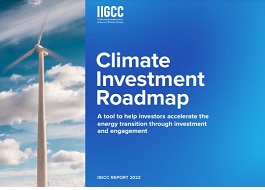
|
| |
|
Climate Investment Roadmap: a tool to help investors accelerate the energy transition through investment and engagement
|
| |
|
The Institutional Investors Group on Climate Change (IIGCC) published their 2022 report, which aims to provide an overview and tools for investors to accelerate the energy transition via their investments and engagement. The report stresses the importance of transitioning toward net-zero alignment, measuring portfolio emissions and mobilizing finance towards climate solutions.
|
|
More >
|
| |
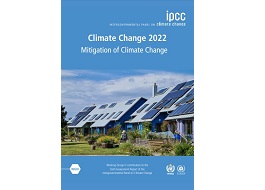
|
| |
|
Climate Change 2022: Mitigation of Climate Change
|
| |
|
The Intergovernmental Panel on Climate Change (IPCC) working group III published its new report with an updated global assessment on climate change mitigation progress and pledges and examines global emission sources. The costs, risks and opportunities of low-carbon technologies are examined using climate modelling to project these along with market data. Finally a number of potential system transformation are explored.
|
|
More >
|
| |
|
|
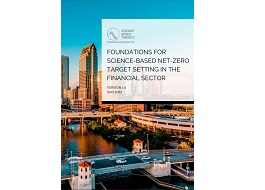
|
| |
|
Foundations for Science-Based Net-Zero Target Setting in the Financial Sector
|
| |
|
This paper represents the first steps in science-based net-zero standard for financial institutions (SBTi-FI) that sets out principles definitions, metrics and target formulation considerations. The document discusses the results of a number of surveys and workshops conducted in December 2021, which span topics ranging from feedback on the five proposed principles for net-zero, the role of carbon credits, fossil fuel financing and metrics and methods.
|
|
More >
|
| |
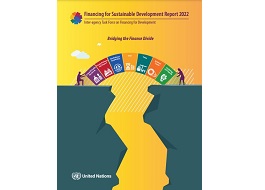
|
| |
|
Financing for Sustainable Development Report 2022: Bridging the Finance Divide
|
| |
|
The Inter-agency Task Force on Financing for Development report for 2022 demonstrates that 3.5 percent of revenue is used by developed countries to pay interest on their debts, while developing countries use 14 percent of revenue. 60 percent of LDCs and low income countries are at a high risk of debt distress, which is twice the percentage as in 2015. The report recommends different actions to bridge this gap.
|
|
More >
|
| |
|
|
|
|
| |
| |
|
Kind Regards,
The SSF Team
|
| |
|
|
|
| |
| |
|
Already a member or partner? Make sure you are featured on our website. Get in touch with us to upload your member or network partner profile now.
Interested in joining our network of members and partners? > Learn more
|
| |
|
|
|
| |
|
|
|
|
| |
| |
|
SWISS SUSTAINABLE FINANCE
|
|
|
| |
|
|
| |
|
|
| |
|
|
| |
|
|
| |
|
|
| |



